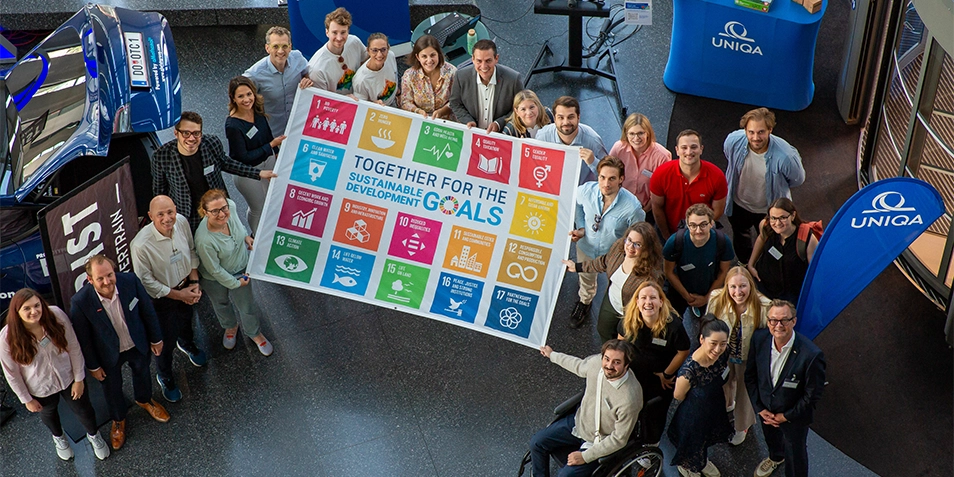UNIQA: Paving the way for the climate transition
The UNIQA Group is committed to sustainable development and consistently strives for the well-being of our society and the protection of our environment. Our brand promise “living better together” inspires us to take responsibility not only for our customers, but also for future generations.

Shared responsibility for a sustainable future
The effects of climate change cannot be overlooked. In response, the insurance industry is developing innovative approaches such as integrating climate-friendly aspects into underwriting processes and promoting sustainable investments. UNIQA is committed to clear strategies for reducing emissions and actively supports customers in adapting to climate-friendly business practices. We are resolutely pursuing the goal of achieving net zero emissions – transparently and in stages.
Sustainability is firmly anchored in our corporate strategy and in the UNIQA Group’s specific sustainability strategy. This combines economic activity with ecological and social obligations.
UNIQA climate strategy: science-based goals and clear visions
The first UNIQA transition plan comprehensively describes how greenhouse gas (GHG) emissions can be reduced in the insurance business, in investments and in the company’s own operations. At the time of publication, the UNIQA Group was the only Austrian insurance company to have this type of plan in place.
UNIQA will achieve net-zero emissions in its business model (insurance business, own operational management) by 2040 in Austria and by 2050 in the Group as a whole (investment, insurance business, own operational management). Measures such as the consistent reduction of emissions in all operational areas, the use of renewable energies and the optimisation of energy efficiency in our own buildings are shaping our path towards this goal. Investments are also being made in sustainable projects and technologies in order to play an active role in shaping the transition to an emission-free future.
As an insurance company, the UNIQA Group clearly assumes responsibility for both direct and indirect emissions, i.e. those arising from financing, investments and property insurance in the real economy. The agreement reached at the UN Climate Change Conference in Paris in 2015 to limit global warming to a maximum of 1.5 degrees Celsius serves as an unequivocal goal.

What are net zero emissions?
We define net zero emissions as
- achieving the greatest possible reduction in our operational CO2 emissions (Scope 1, 2 and 3), bringing them to zero or to a residual level that aligns with global or sectoral net zero pathways, in accordance with scenarios compatible with the 1.5 degree target, and
- neutralising all residual emissions by the net zero target year, as well as any greenhouse gas emissions released into the atmosphere thereafter.
Core objectives of our climate strategy
- Alignment with the Paris 1.5 degree climate target path in investment, underwriting and operational ecology
- Achieving net zero emissions in Austria by 2040 (insurance business, own operational management) and Group-wide by 2050 (investment, insurance business, own operational management)
- Commitment to science-based interim targets (SBTi-validated) by 2030
- Maintaining the volume of sustainable investments of over €2 billion
Science-based objectives are an essential element of these guidelines. Accordingly, we validated Group-wide interim climate targets for four areas of our investment portfolio in 2023 and the interim targets for 2030 for our own operational management through the Science Based Targets initiative (SBTi). This is an important step for the UNIQA Group towards optimising the alignment of the portfolio and the CO2 emissions of its own operations (Scope 1 and 2) with a 1.5 degree climate target.
Science-based targets at a glance
What is the SBTi?
The SBTi is a co-operation between the Carbon Disclosure Project (CDP), United Nations Global Compact (UN GC), World Resource Institute (WRI) and World Wide Fund for Nature (WWF). The aim of the SBTi is to drive forward an ambitious climate policy by setting scientifically sound climate targets.
|
|
2024 |
Target |
|---|---|---|---|
Company management |
Greenhouse gas emissions from owner-occupied buildings and vehicle fleet |
12,574 t CO2e (–13.3% since 2021) |
–42% (between 2021 and 2030) |
Electrification of the UNIQA vehicle fleet |
AT: 57% |
AT: 100% (by 2030) |
|
Investments |
Emissions intensity of the investment portfolio (WACI) |
44 t CO2e/€ million revenue |
40 t CO2e/€ million revenue |
Sustainable investments |
€2.4 billion |
€2 billion (by 2025) |
|
Insurance business |
Greenhouse gas emissions from the corporate customer business (Scope 1 & 2) |
AT: 27,578 t CO2e |
AT: –20% |
Corporate customers with net zero targets (AT) |
48% |
100% (by 2040) |
|
Greenhouse gas emissions from the retail motor vehicle portfolio |
393,405 t CO2e |
– |
|
People |
Employees |
16,394 (HC) |
– |
Gender pay gap (adjusted) |
3.1% |
3.2% (by 2024) |
|
Women in top management positions |
39.4% |
– |
|
Best employer, measured by the EX Index (Employee Experience Index) |
4.0 stars |
4.5 stars |
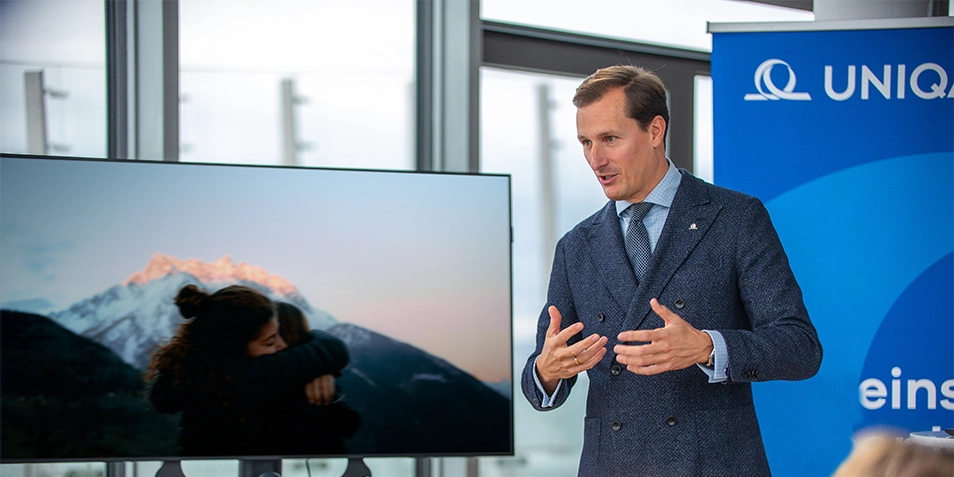
Memberships and sustainability ratings
Knowledge sharing, transparency, the development of joint solutions and the integration of proven procedures are at the centre of our approach to ESG. For this reason, UNIQA is a signatory and member of various global sustainability initiatives:
- Green Finance Alliance (GFA)
- UN Global Compact (UNGC)
- UN Principles for Responsible Investment (PRI)
- UN Principles for Sustainable Insurance (PSI)
- Climate Action 100+
- Net-Zero Asset Owner Alliance (NZAOA)
We also rely on sustainability ratings to increase transparency and the trust of our stakeholders. As well as being an important element in planning sustainability measures, these results also serve as important reference points on the path towards an emission-free and socially sustainable future.
CDP |
B |
ISS ESG |
C– |
MSCI |
BBB |
Sustainalytics |
18.9 |
S&P Global |
43 |
Fossil fuels: consistent exit
A central component of our transition plan is the gradual phase-out of coal, oil and natural gas in investments, the insurance business and our in-house operations management. This step is part of our comprehensive commitment to climate protection and is based on the conviction that fossil fuels are not compatible with sustainable development in the long term. The phase-out enables us to channel resources specifically into renewable energies and climate-friendly technologies. By doing this, we are making an active contribution towards the energy transition and towards minimising the financial and environmental risks associated with fossil fuels. Since 2024, direct investments are no longer made in coal producers or energy suppliers that produce electricity from coal if they generate more than 5 per cent of their revenue from coal. All investments in companies that derive more than 5 per cent of their revenue from oil will be terminated by the end of 2030. For companies in the natural gas sector, this step will be taken in 2035. In the insurance business, we will no longer renew insurance contracts with corporate customers in the coal, oil or natural gas sector from 2030 or, under certain conditions, from 2035. As part of our engagement strategy, we also actively support our corporate customers in transforming their business models to focus on sustainability.
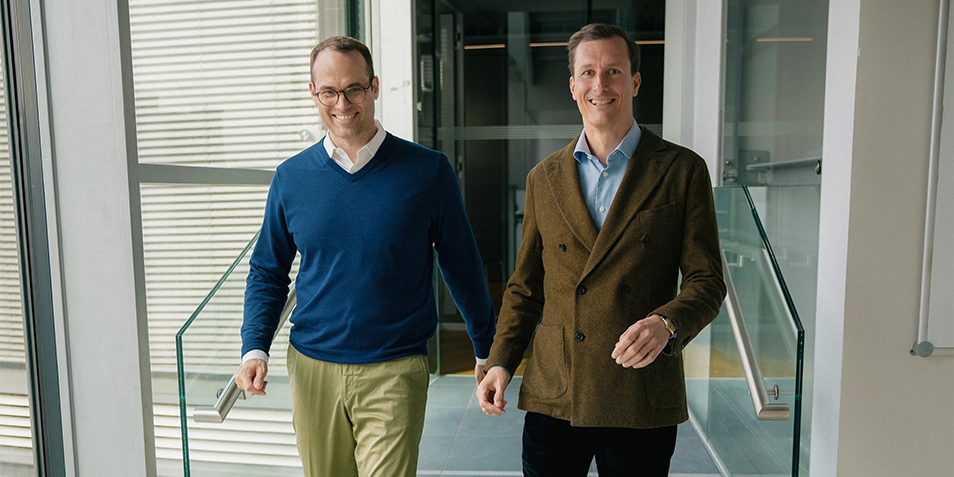
Sustainability in investing
In the area of investment, UNIQA is the first Austrian financial company to be one of the pioneers with targets that are in line with the 1.5 degree target. Our policy of phasing out coal and the plan to phase out other fossil fuels and nuclear energy are set out in our decarbonisation strategy. The UNIQA Group made a commitment in 2019 to implement a variety of coal exclusion criteria in multiple stages. In addition, since 2022, no investments have been made in funds that include companies with more than 10 per cent revenue from thermal coal businesses. Also, no new direct investments in connection with crude oil have been made since the beginning of 2025. As of 2026, we will make no new direct investments in natural gas projects and in companies with more than 30 per cent revenue in the natural gas sector.
Our memberships in the United Nations Net-Zero Asset Owner Alliance (NZAOA) and the Austrian Green Finance Alliance (GFA) mean that the UNIQA Group is committed to the gradual decarbonisation of the portfolio in order to be optimally aligned with the Paris 1.5 degree climate target and to achieve net-zero emissions from investments across the Group by 2050.
We implement a variety of measures as part of our engagement strategy aimed at making contact with our investees both directly and indirectly. These efforts are an attempt to help improve the performance of companies, particularly with regard to their climate strategies and their decarbonisation targets and measures. Through active dialogue, we create a platform that promotes the idea of transition and seeks to initiate sustainable change. By doing this, we hope to avoid the need for divestments and instead support and actively guide companies on their path towards greater sustainability.
Already more than €2 billion in sustainable investments
At the end of 2023, our sustainable investments were worth more than €2 billion. We were able to further increase this figure in 2024 to €2.4 billion, which corresponds to 11 per cent of our total portfolio value. These investments include renewable energies, sustainable infrastructure projects and social projects. The proportion of sustainable investments has therefore doubled within two years.
Sustainability in the insurance business
Corporate customers
As with our investments, we also pursue a very consistent sustainability strategy in our underwriting. We have not written any new business in coal (with more than a 30 per cent share in the respective revenue) since 2019 and no new business in crude oil since 2024. We have also refrained from writing any new business in natural gas since the start of 2025. We also actively support existing customers in transforming their business models to ensure that they are no longer active in the coal and oil sectors by 2030 and no longer in the natural gas business from 2035. We also support our corporate customers in strengthening their resilience to climate-related risks and developing products with components focused on sustainability.
UNIQA Sustainable Business Solutions
The subsidiary UNIQA Sustainable Business Solutions, founded in 2024, supports corporate customers with risk-related issues, climate transition and ESG topics. UNIQA Sustainable Business Solutions supports companies of all sizes – from sole proprietorships to large corporations – in strengthening their resilience through active risk management and harmonising their sustainability strategies with the legal framework. Companies do not need to have an insurance contract with UNIQA to utilise the services.
Private customers
In line with our “UNIQA 3.0 – Growing Impact” strategy, sustainability is also the focus in our retail product development. In Austria, sustainability aspects are already firmly anchored within our advisory approach and in our product development process across all insurance lines. Our range of sustainable insurance products and our advisory services thereby meet the growing demand in this area. An internal review mechanism in place since 2024 ensures that every product we develop in Austria is also analysed and evaluated from an ESG perspective.
We are also gradually integrating sustainability aspects into our insurance products for our international markets. This means that we are not only meeting the needs of our customers, but also specifically promoting sustainable practices.
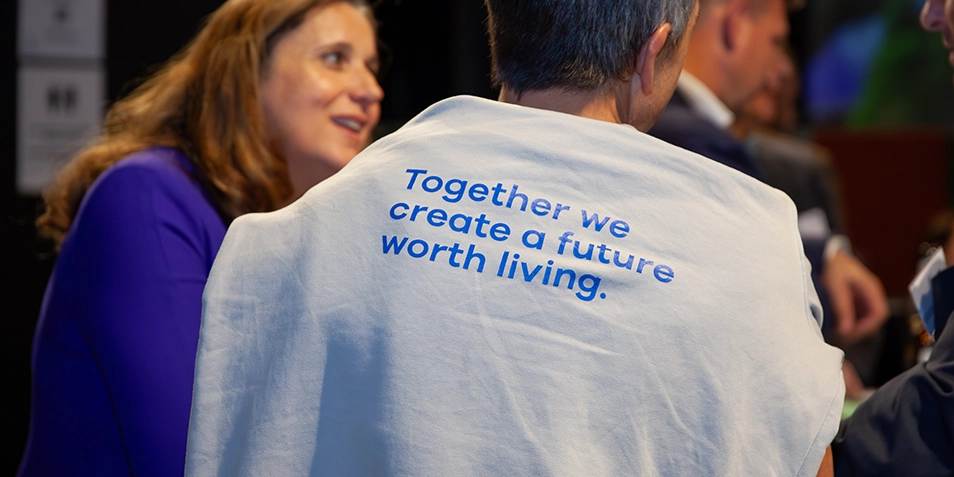
Operational ecology: measures and innovations
In terms of measures aimed at reducing our own CO2 emissions, we rely on the application of international certifications and standards in our dealings with suppliers and on optimisation in our internal environmental management. The UNIQA Group is increasingly utilising renewable energies and reducing CO2 emissions by consistently conserving resources and promoting low-emission mobility.
Milestones and action plan for all sales locations in Austria
- Exclusive purchase of green electricity certified according to eco-label 46 since 2024
- The introduction of an energy monitoring system (throughout Austria and at five other locations in Central and Eastern Europe) not only serves to increase efficiency, but also enables the ongoing optimisation of energy consumption.
- By 2035, 10 per cent of the electricity consumption of the Austrian sales locations is to be covered by self-generated photovoltaic electricity over the course of the year (2024: 8.7 per cent). All oil and gas heating systems will be replaced by ecological alternatives (heat pumps, district heating or biomass heating) by 2035 at the latest.
- Transition to 100 per cent e-cars in the vehicle fleet by 2030 in Austria (2024: 57%) and Group-wide by 2040
UNIQA has set itself a science-based interim target and has committed to reducing the Scope 1 and Scope 2 emissions of its owner-occupied properties and its vehicle fleet by 42 per cent by 2030 compared to the base year 2021. By the end of 2024, these emissions had already fallen by a total of 13.3 per cent.
Photovoltaic projects and energy initiatives
UNIQA already operates several photovoltaic systems and thereby contributes to environmentally friendly self-sufficiency. Here are a few examples:
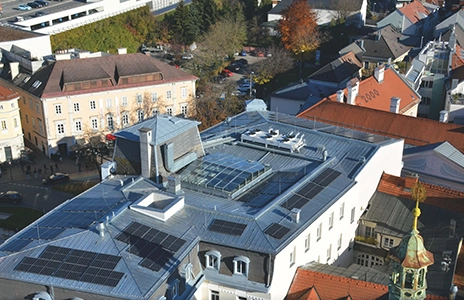
Carinthia & East Tyrol regional office:
With an output of 52 kWp, almost 50,000 kWh of solar power is produced annually.
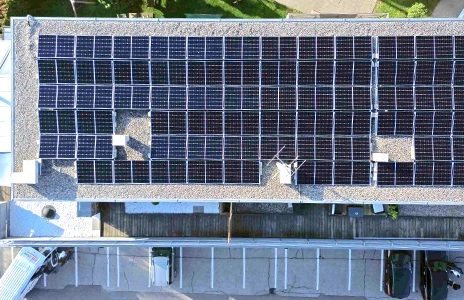
DSGS Wolfsberg General Agency:
Photovoltaic system with 32 kWp output.
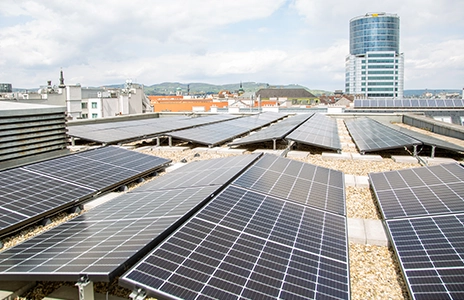
UNIQA Tower (adjacent building):
The Group’s largest photovoltaic system with an output of 125 kWp and an annual electricity production of 100,000 kWh. This system went into operation on a total of seven roofs at the UNIQA Tower and the adjacent buildings on 31 July 2023. The annual production volume corresponds to the consumption of around 30 households and avoids the emission of approximately 21 tonnes of CO2 per year.
The private clinics of the Mavie Med Group (until end of March 2025: PremiQaMed) – which is part of our healthcare holding company Mavie – also make targeted use of photovoltaics, e.g. with their systems in Graz-Ragnitz and Salzburg that can cover up to 20 per cent of local electricity requirements. Not only do these initiatives noticeably reduce operating costs, but they also play a significant part in improving the hospitals’ carbon footprint. They also set a strong example for other healthcare facilities by acting as a role model when it comes to innovative and environmentally friendly solutions.
EMAS environmental management system for the sales locations in Austria
By sustainably running their own business premises, companies can effectively reduce their own direct CO2 emissions. UNIQA Austria relies on proven success models, including energy monitoring, a comprehensive photovoltaic initiative, and the promotion of e-mobility. In addition, we actively support modern working models such as more options for working from home. We underline our commitment to sustainable corporate governance by promoting video conferencing and providing subsidies for public transport tickets.
UNIQA Austria has laid important foundations for establishing an EMAS environmental management system at the Austrian sales locations by adopting a comprehensive environmental policy, implementing seven environmental audits and deliberately developing technical expertise. The regular presentation of our environmental performance and the annual reporting are verified by independent external audits. UNIQA Austria achieved the goal in mid-2024 of being officially recognised as an EMAS-validated company – a milestone that impressively highlights our determination in terms of sustainability.
Employees: raising awareness and commitment
As part of our efforts to consistently align all our business activities with the Paris climate targets, we attach particular importance to raising climate awareness among our employees. After all, our employees play a key role in implementing our climate strategy. We use targeted initiatives and events to create a platform that promotes dialogue and incorporates sustainable thinking and action into everyday working life. We promote discussions and training on topics such as energy, nutrition, mobility and housing with initiatives such as the UNIQA Sustainability Network. Events such as the UNIQA Mobility Day provide practical insights into sustainable mobility, alternative fuels and recycling technologies.
UNIQA Mobility Day
With this in mind, UNIQA employees were given the opportunity to gain an up-to-date overview of the transformation of mobility towards more sustainable alternatives and UNIQA’s contribution as part of World Environment Day 2024 (5 June). Visitors were able to find out about many aspects of sustainable mobility in the foyer at UNIQA Tower and even actively try them out, including: Test drives in the e-car simulator, learning about alternative fuels, testing the UNIQA footprint calculator and much more. There were also presentations by experts on the topics of cycling and walking, UNIQA’s corporate ecology, battery recycling and the development of alternative fuels.
We are also committed to the UN Sustainable Development Goals (SDGs), e.g. through our membership in the UN Global Compact and by flying the SDG flag on the annual SDG Flag Day.
We are setting the standards for a sustainable future in the insurance industry through our consistent actions. The UNIQA Group shows that economic success and ecological responsibility can go hand in hand.

